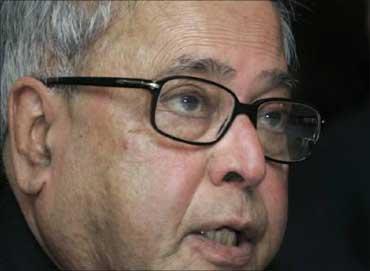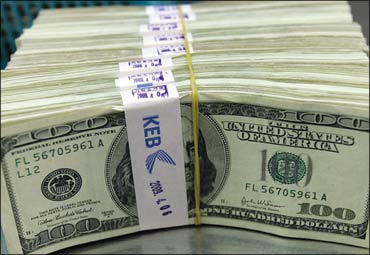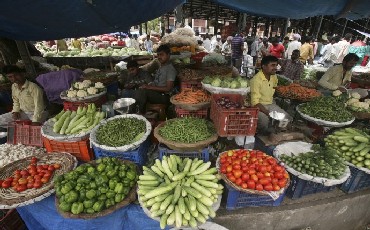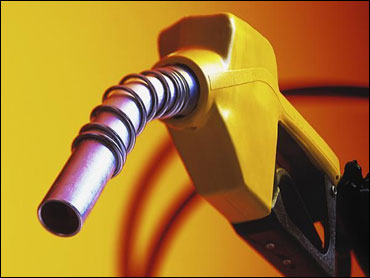Photographs: Reuters
Exuding confidence that the economy will grow by 8.5 per cent in 2011-12, Finance Minister Pranab Mukherjee on Wednesday said the recent hike in prices of petroleum products will not have much impact on the fiscal deficit.
Asked if he will consider rolling back the increase in prices of cooking gas, diesel and kerosene amidst demands from various quarters, the minister said, "No...No question of revoking (price hike)."
As regards the impact of the decision to cut duties on the fiscal deficit, he said the shortfall would be made good by buoyancy in tax collection and improved compliance.
. . .
India to grow at 8.5%; fuel price hike not to hit deficit: FM
Photographs: Reuters
"I do not think so because this was the conscious decision... About Rs 49,000 crore (Rs 490 billion) will be the shortfall in the duty. I think it would be possible for us to make it up through buoyancy and by better compliance," Mukherjee told PTI in an interview.
The government proposes to reduce fiscal deficit to 4.6 per cent of the GDP in 2011-12 from 4.7 per cent a year ago.
In view of the spiralling prices of crude oil in the international market, the Indian government had increased the price of diesel by Rs 3 per litre, LPG by Rs 50 per cylinder and kerosene by Rs 2 per litre. The price hike decision was accompanied by a reduction in excise and customs duties, resulting in a per annum revenue loss of Rs 49,000 crore.
. . .
India to grow at 8.5%; fuel price hike not to hit deficit: FM
Photographs: Reuters
The economy, the minister hoped, would grow by around 8.5 per cent during the current fiscal, the same rate which was recorded during 2010-11.
"I am still holding the projection which I had that is 8.5 per cent plus... We shall have to wait for some time. But it would not be less than 8 per cent plus," he said.
The economy will grow by over 8 per cent despite the conscious decision of the Reserve Bank to sacrifice growth to contain inflation, Mukherjee said, adding that the government and the central bank have been trying to strike a balance between containing growth and promoting inflation.
. . .
India to grow at 8.5%; fuel price hike not to hit deficit: FM
Photographs: Reuters
"One need not cancel the other, but controlling inflation is essential. In a developing economy like ours, if we cannot bring inflation within a manageable limit, the hardship goes to the weaker sections of the people... they are the worst sufferers," the minister said.
Mukherjee was here to participate in the 'US-India Economic and Financial Partnership' jointly organised by the Confederation of Indian Industry and Brookings Institute, a Washington-based think-tank.
Sacrificing growth, the RBI has raised key policy rates ten times since March, 2010, to contain inflation, which is hovering at around 9 per cent. Inflation stood at 9.06 per cent in May.
. . .
India to grow at 8.5%; fuel price hike not to hit deficit: FM
Photographs: Reuters
Controlled inflation is needed, Mukherjee said, adding that the "best course would be to reduce inflation to have it at the acceptable moderate level and also to have reasonable high growth rate... because if you want to have high growth which is not realistic, that would lead to inflationary pressure."
On the other hand, he said the country cannot afford to have very low growth, as it would mean less jobs and no wealth creation. "So we shall have to strike a balance and exactly we are doing that," the minister said.
The Reserve Bank, which is slated to hold its next review of the monetary policy on July 26, has pegged India's GDP growth in 2011-12 at 8 per cent, lower than the 8.5 per cent rate recorded in the previous fiscal.






article